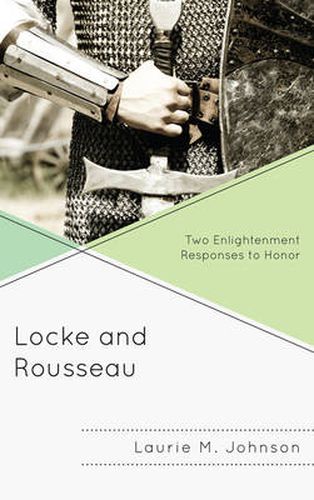Readings Newsletter
Become a Readings Member to make your shopping experience even easier.
Sign in or sign up for free!
You’re not far away from qualifying for FREE standard shipping within Australia
You’ve qualified for FREE standard shipping within Australia
The cart is loading…






Laurie Johnson investigates two Enlightenment-era reactions to honor in Locke and Rousseau. She provides an in-depth analysis of how political philosophers John Locke and Jean-Jacques Rousseau react differently to the place and importance of honor in society. Locke continues the trend of rejecting honor as a means of achieving order and justice in society, preferring instead the modern motivation of rational self-interest. Johnson explores the possibility of an honor code that is compatible with Lockean liberalism, but also points out the problems inherent in such a project. She then turns to Rousseau, whose reaction to Enlightenment ideas reveals our own divided mood. Rousseau’s worries and ambivalence about honor are our worries and ambivalence, and his failed attempt to revise honor in a way that works within the modern system highlights how difficult any project to resurrect the value of honor will be. This book will interest anyone who wonders what happened to honor in our world today, including students of communitarianism. Johnson warns us that we cannot simply look to the past, to the ideals of Locke or other Enlightenment thinkers such as the American founders, for answers to our current family, social, and economic problems, because our problems at least partly stem from Enlightenment liberal thought. Instead we must fully recognize this connection before we can start to formulate a definition of honor that can work for us today.
$9.00 standard shipping within Australia
FREE standard shipping within Australia for orders over $100.00
Express & International shipping calculated at checkout
Laurie Johnson investigates two Enlightenment-era reactions to honor in Locke and Rousseau. She provides an in-depth analysis of how political philosophers John Locke and Jean-Jacques Rousseau react differently to the place and importance of honor in society. Locke continues the trend of rejecting honor as a means of achieving order and justice in society, preferring instead the modern motivation of rational self-interest. Johnson explores the possibility of an honor code that is compatible with Lockean liberalism, but also points out the problems inherent in such a project. She then turns to Rousseau, whose reaction to Enlightenment ideas reveals our own divided mood. Rousseau’s worries and ambivalence about honor are our worries and ambivalence, and his failed attempt to revise honor in a way that works within the modern system highlights how difficult any project to resurrect the value of honor will be. This book will interest anyone who wonders what happened to honor in our world today, including students of communitarianism. Johnson warns us that we cannot simply look to the past, to the ideals of Locke or other Enlightenment thinkers such as the American founders, for answers to our current family, social, and economic problems, because our problems at least partly stem from Enlightenment liberal thought. Instead we must fully recognize this connection before we can start to formulate a definition of honor that can work for us today.